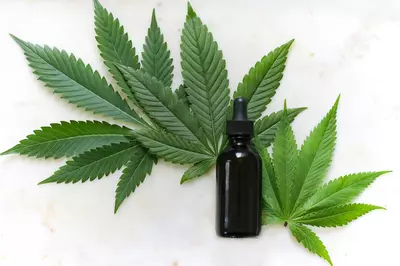CBD Oil: Facts You Should Know

Since 2018, one product has exploded onto the market in the United States more than any other, advertising itself as an antidote to sleeplessness, anxiety, stress, pain, and even acne. From tinctures to infused lotions and dog treats, cannabidiol (CBD) has made its way into hundreds of products that claim to enhance wellbeing. But is the hype real? And should you try CBD for yourself?
Although there is plenty of information out there, navigating it can be confusing. As with any new treatment option, you need to do a careful risk-benefit analysis before diving in.
Considering using CBD oil? Here’s what you need to know.
CBD won’t get you “high.”
Many people assume that CBD oil and marijuana are the same thing, but that’s not quite accurate. The Cannabis sativa plant, also known as cannabis or marijuana, has hundreds of different compounds in it. The two most well-known are Tetrahydrocannabinol (THC) and CBD. While THC has psychoactive properties (the “high” feeling that marijuana is well-known for), CBD does not.
There are risks to using CBD.
While excitement over this potentially beneficial treatment is growing, there are a few reasons why you should exercise caution when considering it:
- The clinical evidence is still in its infancy. While there are many anecdotal reports of CBD’s positive effect on everything from insomnia to pain to HIV, the scientific evidence doesn’t yet match the hype. The most promising evidence is for the use of CBD to treat a rare form of childhood epilepsy. In fact, the evidence is so strong in this area, that in 2018 the United States Food and Drug Administration (FDA) approved the first-ever CBD-derived medication to help with this condition.
 CBD is not regulated in the United States in any instance other than one particular epilepsy medication. Without regulation, there is no way to ensure that a product is marketed accurately or that its contents have been measured and dosed appropriately. Many products that claim to contain only CBD actually have higher-than-advertised amounts of THC in them, which can cause unwanted psychoactive effects.
CBD is not regulated in the United States in any instance other than one particular epilepsy medication. Without regulation, there is no way to ensure that a product is marketed accurately or that its contents have been measured and dosed appropriately. Many products that claim to contain only CBD actually have higher-than-advertised amounts of THC in them, which can cause unwanted psychoactive effects.
- CBD can cause reactions with other medications. The World Health Organization states that although “CBD is generally well tolerated with a good safety profile...reported adverse effects may be as a result of drug-drug interactions between CBD and patients’ existing medications.” Most experts agree that CBD can interfere with other medications, so it’s important to consult a healthcare provider before trying the oil out yourself.
- The legality of CBD in the United States is...complicated. After the passing of the 2018 Farm Bill, which allowed the non-THC version of the Cannabis sativa plant - hemp - to be used in agriculture, the doors opened for a flood of CBD products made from hemp to enter the market. The laws change constantly, but in general, it is only federally legal to sell CBD products in the United States if a number of restrictions are met, though many states have individual laws stating otherwise. The legality is so complicated that the FDA has taken a backseat to enforcing the federal law - but the organization does firmly state that it is illegal to sell or purchase CBD that is marketed as a dietary supplement or has been added to food.
While there are many anecdotal reports of CBD’s positive effect on everything from insomnia to pain to HIV, the scientific evidence doesn’t yet match the hype.
There might also be benefits to using CBD.
Most experts agree that there needs to be more research on the impact of CBD oil on health conditions, because many of the current studies don’t use a placebo, have mixed results, or are solely based on animal research. However, many also argue that even though the studies are early, they are promising, and that CBD is generally safe. A 2015 systematic review found moderate evidence for the use of cannabinoids to treat chronic pain, but low-quality evidence to support its effect on nausea, vomiting, weight gain in HIV, sleep disorders, or Tourette’s.
The best course of action, then, might be to wait as the body of research grows and the legality and regulations around CBD are streamlined before trying CBD oil to manage a health condition.
Want to use CBD oil now? Do this first.
But if you really want to try it now, here is what the Mayo Clinic’s Clinicians’ Guide to Cannabidiol and Hemp Oils recommends:
- Talk to a healthcare provider first, before you make any decisions. If your provider doesn’t have knowledge of CBD products, ask if they know another provider who does.
- Use products from Europe, where CBD is better regulated and products have an even stricter requirement for maximum THC levels.
- Read labels and fine print carefully. Clinicians recommend using products that are labeled certified organic by the USDA, and whose ingredients are not simply “hemp seed oil.” Also take some time to peruse the company’s website, including their standards section and whether they have an independent adverse reporting program. If these things aren’t listed, skip it. Another helpful guideline is Mayo’s checklist for finding a high-quality product.